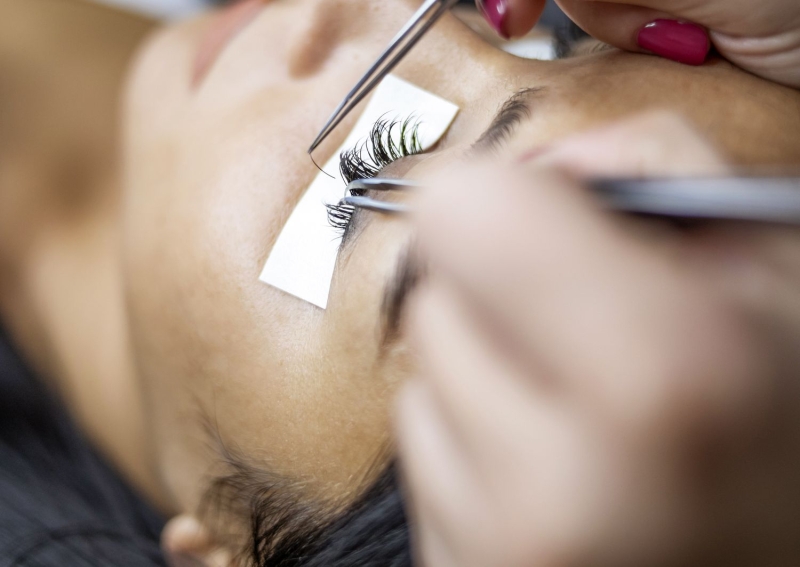Contents
Including the cost, application process, and maintenance.
The quest for long, thick, luscious lashes has no sign of waning with celebrities and influencers alike sharing their eye-popping faux lashes on social media. “But it’s the general population who has really embraced the look,” says Clementina Richardson, the founder of Envious Lashes.“To be able to jump out of bed in the morning with wide awake eyes and to reduce the number of steps in your makeup routine — who wouldn’t want to give extensions a try?” Agreed!
Lash extensions are hairs made of synthetic fibers that are glued to natural lashes to enhance their length, curl, and thickness. If you've been dying to give lash extensions a go but have a few questions, we've got all of the answers, ahead. Consider this your official guide to lash extensions.
The Cost of Eyelash Extensions
Extensions and their maintenance are expensive, with the price dependent on the lash artist’s experience and location. On average, a full set of lash extensions can range anywhere from $100 to $400+, with refill appointments costing between $50 to $250+. “As with most things, you get what you pay for,” says Singleton. “Someone with many years of experience and education will most likely charge more than someone who’s just starting out.”
How to Find a Reputable Lash Artist
“Anyone can be certified to apply lash extensions — all that means is they’ve taken a course and passed an exam,” says Robert Schwarcz, MD, a double-board certified oculoplastic surgeon in New York City. “I recommend looking for a lash technician licensed in the state where they practice who has passed the state-required testing.” Dr. Schwarcz also advises working with licensed professionals who have a track record of success and positive reviews. “Ask to speak with their other clients and if you get any pushback, take that as a warning signal and find someone else,” he says.
How to Prepare for Eyelash Extensions
To ensure a successful outcome: Make sure your lashes are clean of any makeup or oil-based products, avoid drinking caffeine or energy drinks as they can cause your lashes and lids to flutter during the process, and dress comfortably and bring headphones so you can listen to music or your favorite podcast. “You may be laying down anywhere from one to three hours,” says Cynthia Tsang, the founder of Lash L’Amour in Boston. Also, try not to speak during a lash treatment. “When people talk, they often flutter their eyelids, making it harder and more dangerous to isolate the lashes holding a sharp tool so close to their eyes,” says Robyn Fisher, owner of Makeup by Robyn Fisher. “Talking also slows down the process and any type of cheek movement can shift the eye pads.”
The Application Process, Step-by-Step
1. Prep
Once the type, length and curl has been determined, the lash artist will cleanse the natural lashes before placing gel pads under the eyes and taping down the lower lashes using a medical-grade tape to ensure they won’t interfere with the procedure and to protect the eye area from sharp tweezers.
2. Prime and Map
An eyelash primer is then applied to the base of the natural lashes to enhance the bond between the lash extensions and natural lashes. “At this point, some technicians will map out the lashes on the undereye gel pads with a sharpie pen, taking into account facial features like the angle, shape and spacing of the eyes to determine how many and where to apply the extensions,” says Trina Dial, the founder of Maven Artistry.

3. Application
Next steps include dipping the base of the extension into an adhesive with tweezers and applying the faux lashes to the natural lashes.
4. Curing
Once the application process is complete, a retention-boosting bonder is applied to cure the adhesive and reduce the chances of sensitivity and irritation. Final steps include misting the extensions with distilled water for a hit of hydration and then drying them with a small fan to help cure the adhesive, set the bonder and soothe the eyes.
How to Maintain Lash Extensions
Lash extensions typically last anywhere between four to six weeks, depending on where your lash is in its growth cycle — an extension will shed faster if the natural lash is in the final growth phase and last longer if they’re in the initial growth period. How long they’ll stay on your eyes also depends on how well they’re cared for and maintained.
“Refill appointments are required every two to three weeks as your natural lashes shed. If you wait too long, you may have to start all over again with a fresh set of extensions,” says Richardson. “Clients should have retained 50 to 70 percent of their extensions when they come in for a refill.”
1. Use Oil-Free Makeup Remover
Always use an oil-free makeup remover or lash shampoo when washing extensions, as oil-based products can break down and weaken the adhesive bond.
2. Pat Your Lashes Dry
To eliminate clumping or tangling, don’t let your lashes air dry — instead, gently blot them with a soft towel before a daily combing with a spoolie brush. “Avoid direct heat from blow dryers, ovens, saunas and BBQ grills which can lead to lash breakage,” notes Dial, who shares it's a misconception that new extensions need to stay dry for the first twenty-four hours. “The materials we use have evolved to the point where we can wash the lash line almost immediately,” she says. “Some will even argue washing the lashes right after application helps to reduce potential irritation.”

3. Protect Them Overnight
Try to sleep on your side on a silk pillowcase or purchase a mask specially designed to protect eyelash extensions from sites like Slip and Smug.
4. Commit to Regular Fills
Truth is, lash extensions are not for everyone. “If you’re not able to commit the time and money to regular refills, you’ll never get the look you desire,” says Fisher.
Potential Side Effects and Risks
Possible side effects include allergic reactions to the pads, tape, or glue and damage to your natural lashes. “It’s important to communicate any allergies to the technician before your appointment or during the service if you experience any discomfort,” says Dr. Schwarcz, who strongly suggests a patch test. “Have your technician apply a small amount of adhesive to the underside of your wrist, let it sit for 15 minutes, then remove it with a solvent. Wait another 15 minutes to see if your skin has a reaction and if so, pass on extensions as the skin around your eyes is more sensitive than the skin on the underside of your wrist.”
Overall, Dr. Schwarcz condones the use of extensions when applied by a properly trained professional who adheres to safety and cleanliness techniques, but he doesn’t recommend them for long-term use. “Continual use can disrupt a lash’s natural growth cycle and cause it to shed prematurely. And when your lashes grow back, they may appear finer and shorter than before,” he says. “Even if you opt for the smallest or most lightweight extensions, it’s important to give your lashes a break.”
Frequently Asked Questions
- Which are the best lash extensions for beginners?
If you’re new to extensions, consider a classic set between .06mm and .12mm with a thickness of no more than 0.15mm. “Combined with a natural style, this look is flattering on everyone,” says Fisher. “From there, you can play with the amount of curl, volume, and shape.”
- Can I wear mascara with lash extensions?
“Mascara has a tendency to cause natural lashes and extensions to clump and wearing it defeats the purpose of having extensions,” says Malin Singleton, the owner of Art of Lash. Richardson notes the additional weight on natural lashes can cause the extensions to shed sooner and warns you risk breakage while removing the mascara. “If you’re getting close to the end of your shedding cycle, and you can’t make it in for a refill appointment, you can opt to wear some mascara to get by,” she says.
- Are at-home extensions an option?
Lash artists do not support at-home applications. “Professionals apply lash extensions from behind their client’s head and with the client’s eyes closed," says Richardson. How can a person do that to themselves? Plus using sharp tweezers near the eyes can be dangerous and the glue in some of these kits has strong fumes that can sting the eyes and cause them to water — not an ideal situation when you’re putting on lashes.”
- What should I do if I want to take a break from my lashes?
Extensions fall off as your natural lashes shed, every four to six weeks. “However, if you want to remove them sooner, it's best to visit a professional lash artist,” says Tsang. “The process involves applying a lash remover cream to break down the adhesive, followed by a gentle brushing and wiping to slide the extensions off.”
